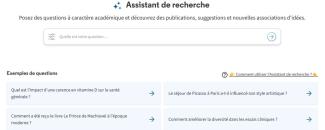🔍 What is the Research Assistant?
The Research Assistant is an artificial intelligence (AI)-based tool that helps you explore academic content from the ULiège Library catalogue by asking questions in natural language.
It relies on data from the ULiège Library research portal to identify five relevant documents, then summarises key information from them to provide an answer to your question.
⚙️ How does it work?
- Your question is interpreted using a Large Language Model (LLM), currently GPT-4o-mini.
- The tool searches for the most relevant documents in the catalogue index (scholarly articles, books, reports, theses, etc.).
- It generates a response based on the abstracts and descriptions of five documents.
- Each part of the answer is linked to a source, clearly cited in the text.
Important: The Assistant does not replace human expertise. It is intended to support understanding and should be complemented by consulting the suggested sources and documents.
💡 How to Ask a Good Question
For better results:
- Ask a clear and specific question.
- Focus on an academic or scientific topic.
- Optionally use filters for source types, publication years, and availability.
- Avoid vague or overly broad queries.
Examples of good questions:
- What are the effects of climate change on marine biodiversity?
- How does Simone de Beauvoir approach the notion of freedom?
Examples are also available on the Research Assistant's home screen.
🌐 Supported languages
You can ask your questions in various languages: French, English, Dutch, German, Spanish, Italian...
The tool adapts its search based on the language of your question and provides an answer in the same language. However, the sources may not necessarily be in the language of your question.
Note: The majority of indexed documents are in English.
📰 Which sources are not used?
Not all resources from the ULiège Library catalogue are taken into account by the Research Assistant:
- printed materials (books, dissertations, maps...) and older digitised dissertations;
- references from ORBi, MatheO and DONum;
- news content, such as newspaper articles and news bulletins;
- publications from the publishers Elsevier (ScienceDirect), JSTOR, and APA (PsycArticles), as they do not allow their content to be used by the Research Assistant employed by the library;
- sources without abstracts or with only very brief records.
You can use the option Show more results from ULiège Library collections to search across all our catalogue's resources. You will not receive an AI-generated summary, but you will gain access to resources that are not processed by the Research Assistant.
Note: From 2026 onwards, the Research Assistant is expected to be able to use printed materials and references from ORBi, MatheO and DONum, provided they include an abstract.
🚫 Current Limitations
The Assistant does not support:
- Specific instructions regarding a time period (e.g., "Find me the most recent studies on cyberbullying") or a document type (e.g., "Give me peer-reviewed articles on amphibian migration"). You will need to use the available filters for that.
- Follow-up questions: the Research Assistant is not a conversational AI.
For example, after asking "What topics did Simone de Beauvoir write about?", you cannot then ask a second question such as "And what does she say in this book?". Instead, rephrase your query: what is the content of Simone de Beauvoir's The Second Sex?
Note: Although powerful, language models have limitations and may produce inaccurate answers. Users are always advised to verify the accuracy of responses by consulting the provided sources.
🔁 What to do if the answer doesn't suit you?
- Click "Try again" to generate a new response.
- Explore the related questions suggested by the AI.
- Use the "Show more results in ULiège Library collections" button to launch a search across the entire catalogue.
🔐 Privacy and Data Protection
The Research Assistant respects the confidentiality of your data. No personal information (name, user ID, IP address, etc.) is collected or stored when you use the tool:
- Your interactions are anonymous: When you use the rating functions (👍 / 👎) to give feedback on a response or the suggested sources, your input is processed in a fully anonymised manner. Only institutional information (the University of Liège) is retained for global analysis and continuous improvement of the tool.
- Search history: By default, the Assistant retains your last 200 questions to allow for aggregate usage analysis. However, you can disable this feature in your account settings. No data is stored that would allow personal identification.
📄 Additional Resources
For further information, please consult:
- the ULiège Charter for the use of generative artificial intelligence in academic work;
- the AI-powered tools listed by ULiège's faculty educational technologists;
- Clarivate's policy on data protection and the use of language models: Clarivate Academia & Government – Use of Generative AI.
You can also make an appointment with a member of our team for help using the Research Assistant.

